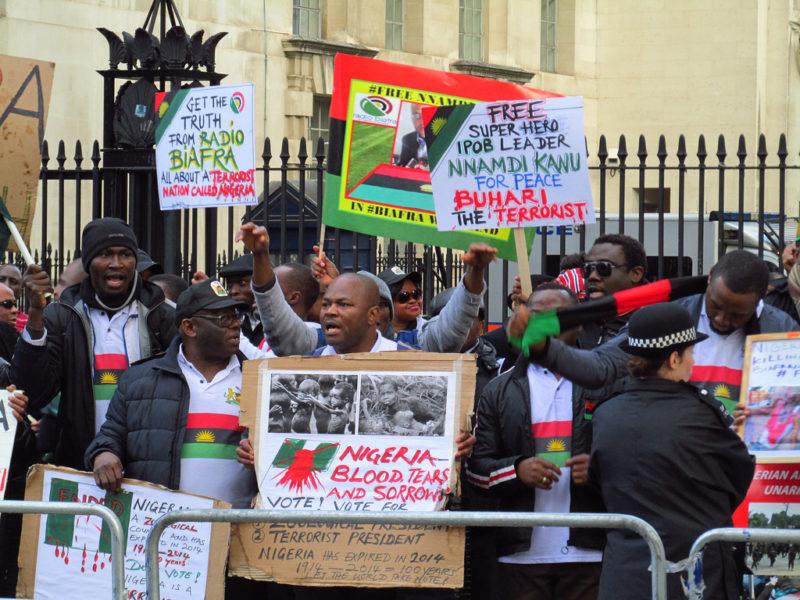The search for peace saw Nigerian leaders journeying to Aburi, Ghana, in such a gathering did lie the nation’s last hopes for a peaceful resolution, while the eastern contingent led by
Colonel Ojukwu
came to that meeting understanding the import of such a meeting and the grave consequences\xa0 of not finding a lasting solution\xa0 to ending the bloodshed, the killings and the displacement of over 3 million Eastern Region citizens came to that meeting prepared to the hilt, Gowon on the other hand came to the meeting with the impression that it was an old boys reunion, something of an officer’s mess gathering irrespective of the gloom that pervaded the air then. To Gowon and his ilk it didn’t matter that over 500 000 Eastern region citizens had been killed and another 500,000 or more maimed and displaced, what was more important was that the regions return to the status quo.
It is alleged that Ojukwu rebuffed such a posturing and demanded that concrete steps be taken one that would provide for a confederation of regions with significant autonomy, particularly in matters of finance and security. For Ojukwu and the Eastern Region, this arrangement offered the region the protection they sought while remaining within Nigeria. For Gowon and the federal government, it provided a framework for keeping Nigeria together despite the centrifugal forces threatening to tear it apart.
However, upon returning to Nigeria, Gowon facing pressure from minority technocrats who viewed the Aburi Agreement as a betrayal of the minorities who were seeking to establish some form of independence from the supposed Igbo domination and a capitulation to Eastern demands. Legal advisors argued that the confederal arrangement agreed upon at Aburi was tantamount to dismembering Nigeria. Federal civil servants, led by Permanent Secretary Allison Ayida, produced memoranda highlighting the dangers of implementing the Aburi decisions.
Rather than seek a rapprochement with Ojukwu to at least arrive at\xa0 further middle grounds took the\xa0 eventual decision to repudiate key aspects of the Aburi Accord, this proved to be a fatal miscalculation and set Ojukwu who had earlier adopted a dovish stance towards the path of secession.\xa0 This betrayal of the Aburi spirit convinced Ojukwu and many Easterners that the federal government could not be trusted and that peaceful coexistence within Nigeria was impossible.
Lieutenant Colonel Chukwuemeka Odumegwu Ojukwu stands at the center of the Biafran controversy, and his motivations remain a subject of intense debate. Critics argue that his declaration of Biafra was motivated by personal ambition and a desire to create his own kingdom where he could rule as a strongman. However, these critics forget that the repudiation of the Aburi Accords placed Ojukwu in a quagmire, how could he look his people in the face, a people rife with anger and repeatedly clamouring that ojukwu nye anyi egbe( Ojukwu give us guns) and do otherwise? How could he ask his kinsmen and women to go on with one Nigeria when on two occasions he had done so only for another set of pogroms to be unleashed on them?
However, a more nuanced examination of the circumstances suggests that Ojukwu was responding to genuine threats to the survival of his people. The systematic killings of Easterners, the massive refugee crisis, and the federal government’s apparent inability or unwillingness to protect Eastern lives created an existential situation that demanded decisive action. The Eastern Region Consultative Assembly, comprising traditional rulers, intellectuals, and community leaders, had unanimously mandated Ojukwu to take any action necessary to protect Eastern lives, including secession if required.
Ojukwu’s own statements and actions suggest that he viewed secession as a last resort rather than a preferred option. His consistent advocacy for the implementation of the Aburi Accord, even after declaring independence, indicates that he would have preferred a confederal arrangement within Nigeria. The timing of the Biafran declaration, coming only after Gowon’s repudiation of Aburi, the imposition of an economic blockade on the East and the provocative creation of states supports the argument that Ojukwu was pushed into secession rather than actively seeking it.
The die was cast and on May 30, 1967, Ojukwu declared the independence of the Republic of Biafra, named after the Bight of Biafra. Gowon responded by declaring a state of emergency and mobilizing federal forces to preserve Nigerian unity.
The war that followed was characterized by immense suffering on all sides. What began as a conflict over political arrangements evolved into a humanitarian catastrophe that claimed over one million lives, mostly civilians who died from starvation and disease. The international community became involved, with various countries supporting different sides for their own strategic reasons, further complicating efforts at resolution.
The Nigerian Civil War offers profound lessons about the fragility of national unity and the catastrophic consequences of political failure. The crisis demonstrated how quickly ethnic suspicions readily escalate into violence particularly when political institutions fail to manage diversity effectively. It highlights the dangers of winner-take-all politics in multi-ethnic societies and showed how military intervention, far from solving political problems, can exacerbate existing tensions.
However, more than five decades after the war’s end, Nigeria and its key actors appears to have learned little from this traumatic experience. Contemporary political discourse still revolves around ethnic and religious identities rather than issues of governance and development. The rise of various separatist movements, including the Indigenous People of Biafra (IPOB), suggests that the underlying issues that led to the original crisis remain unresolved. Political leaders continue to manipulate ethnic and religious differences for short-term gains, while the federal system remains skewed in ways that perpetuate feelings of marginalization among various groups.
Provided by SyndiGate Media Inc. (
Syndigate.info
).







